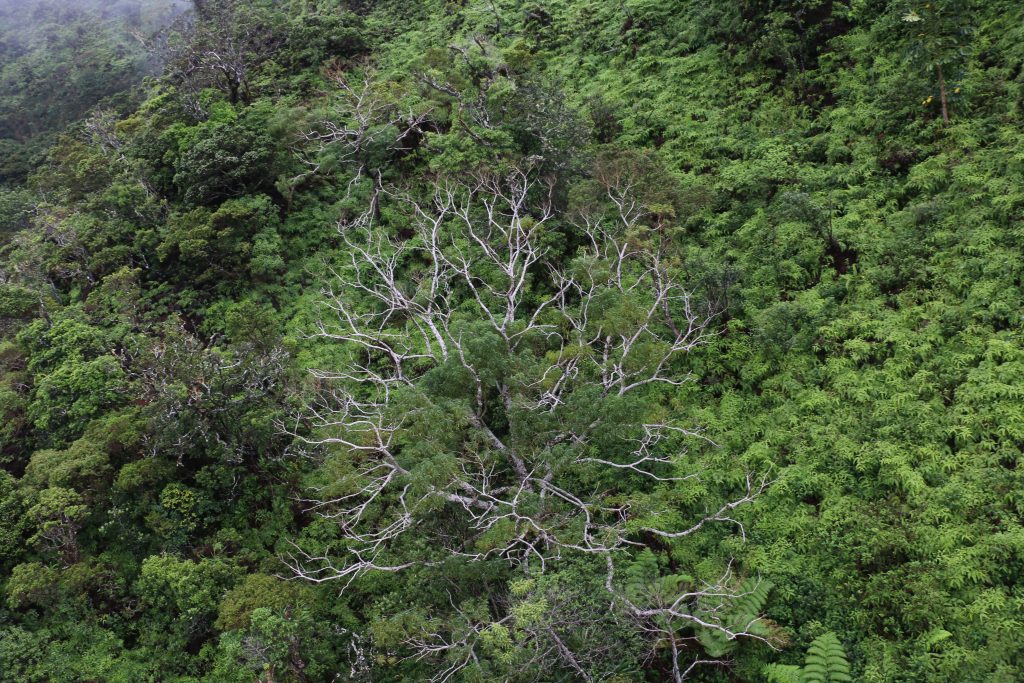05/15/18 – Arial Surveys on O‘ahu for Rapid ʻŌhiʻa Death Take on New Urgency; Suspect Trees Will Have Additional Sampling
Posted on May 15, 2018 in Forestry & Wildlife, News ReleasesDEPARTMENT OF LAND AND NATURAL RESOURCES
News Release
| DAVID Y. IGE GOVERNOR |
SUZANNE D. CASE
CHAIRPERSON |
For Immediate News Release May 15, 2018

AERIAL SURVEYS ON O‘AHU FOR RAPID ʻŌHIʻA DEATH TAKE ON NEW URGENCY
Suspect Trees Will Have Additional Sampling
(HONOLULU) – A team from the O‘ahu Invasive Species Committee (OISC) conducted part of a regularly planned aerial sketch mapping mission over the southern Ko‘olau Mountains today. Their mission was cut short due to bad weather but they hope to finish their work soon.
DLNR Division of Forestry and Wildlife (DOFAW) personnel and invasive species committees on O‘ahu, Maui, Kaua‘i and Hawai‘i Island conduct twice-annual overflights of native forests, where ʻōhiʻa is present in large numbers. Last week’s announcement that one of two species of Rapid ʻŌhiʻa Death (ROD), known as Ceratocystis huliohia, was positively identified as killing at least five trees in the Moloa‘a Forest Reserve on Kaua‘i has given survey teams a renewed awareness and sense of urgency.
Kepano Carvalho, an OISC field associate and field supervisor Nate Dube flew up and down steep valleys looking for the telltale signs of the disease. Carvalho explained, “We got trained on the Big Island for what to look for. Trees that may have all their leaves, but they’re red and shriveled up or the tree is lacking foliage altogether. We take pictures of suspect ʻōhiʻa and make accurate notation with GPS as to where a tree is located. Back on the ground we then try to actually get to the tree to take samples to send to the lab for verification.”
Carvalho added, “It’s not that we weren’t taking this seriously before; with the Kaua‘i confirmations our sense of urgency went up. We’re going to try and sample a lot more trees and get all of our bi-annual aerial surveys completed on time.”
The various island Invasive Species Committees have a shared mission of stopping the spread of invasive species like Rapid ʻŌhiʻa Death. On Oʻahu, the news from Kaua‘i is prompting OISC to institute decontamination procedures whenever the crew encounters ohia forest and not just when sampling dead trees. These procedures have become commonplace on the Big Island and now on Kaua‘i. These include using 70% isopropyl alcohol and scrub brushes to get mud off boots, washing the wheel wells and undercarriages of vehicles used in forest areas, decontaminating tools and avoiding moving any ʻōhiʻa wood or wood products from place-to-place.
Recently researchers found there are two different species under the ROD umbrella. Ceratocystis huliohia, the less serious of the two, recently confirmed on Kaua‘i and Ceratocystis lukuohia, which is largely responsible for the devastation of millions of ʻōhiʻa trees across 135,000 acres on Hawai‘i Island, since ROD was first identified more than four years ago.
It’s not believed at this time that Ceratocystis huliohia spread from the Big Island to Kaua‘i. Since it kills trees much slower than its more aggressive cousin, researchers think it could be present in native forests around the state and have been so for a very long time. Increased awareness of what to look for by people working in and surveying in forests may be the primary reason the trees on Kaua‘i were detected and subsequently tested.
There is currently no treatment for either strain of Rapid ʻŌhiʻa Death and that’s why scientists, field crews, and land managers are encouraging everyone who goes into a forest for any reason to practice good decontamination techniques. Oʻahu residents may report dead or dying ʻōhiʻa to [email protected] or 808-266-7994. Photos of the tree and specific locations are extremely helpful to be able to sample the tree later.
# # #
MEDIA CONTACT
Dan Dennison
Senior Communications Manager
Hawaii Dept. of Land and Natural Resources
1151 Punchbowl Street, Room 131
Honolulu, HI 96813
